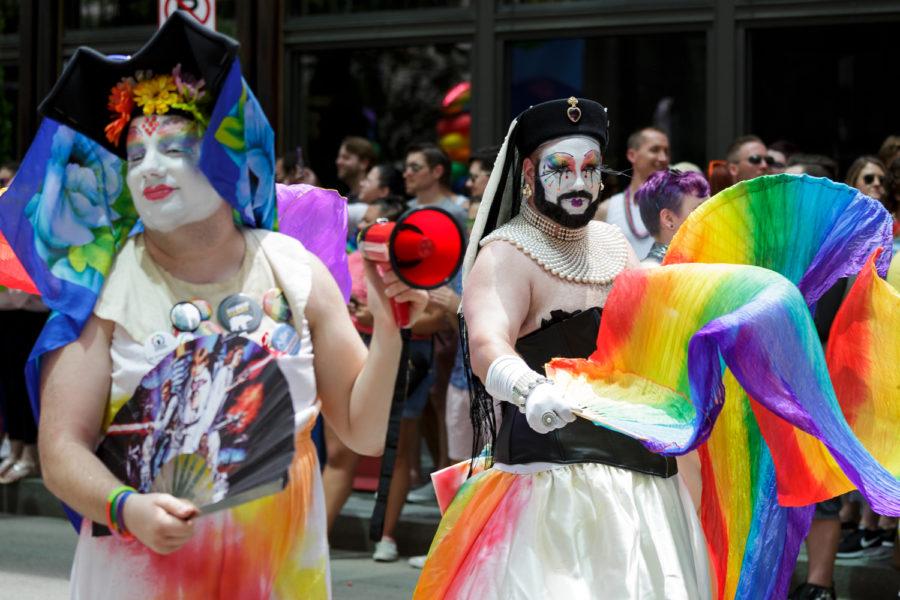Delta Foundation’s Pride offers space for LGBTQ+ expression
The Steel City Sisters at Sunday’s Equality March.
June 12, 2019
Roaring music, dancing and cheers filled the atmosphere in Downtown on Sunday afternoon as the annual Pittsburgh Pride Equality March passed through the streets, celebrating the LGBTQ+ community and its history.
This year, the annual Pittsburgh Pride and Equality March, organized by the Delta Foundation of Pittsburgh, was the largest ever. It took place on June 8 in the heart of Downtown, with thousands of Pittsburghers participating.
According to James Egan, an assistant professor in the Pitt School of Public Health, Pride is a political action and represents LGBTQ+ individuals seeking societal equality after poor treatment in the 1960s.
“For me, the first few Prides in the ’90s [was about] the idea of reclaiming public space and occupying with queer bodies all at once was life changing. Because especially in the ’80s and the ’90s, there wasn’t a lot of positive queer representation in media,” Egan said. “To claim the public space felt like a revolutionary thing.”
But some Pittsburghers say that the Foundation has allowed its Pride to stray from its origins and become overrun by corporations and instead marched in the third annual People’s Pride.
The first Pride took place the year after the Stonewall Riots, the 1969 series of demonstrations at New York City’s Stonewall Inn that kicked off the modern gay rights movement. There were hurdles along the way, especially during the HIV and AIDS epidemic, which claimed the lives of at least 325,000 LGBTQ+ individuals, according to the Ryan White HIV/AIDS Program. However, attitudes have changed — according to a Pew Reseach Poll, 61% of Americans support same-sex marriage in 2019 compared to the 37% approval in 2009.
For some individuals, Pride is a way to reveal their identity without fear of repercussions. Eugene Lin, a second-year student studying prosthetics and orthopedics in the Pitt School of Health and Rehabilitation Sciences, said participating in Pride was an opportunity for him to be part of a larger community.
“For me, it is about accepting myself for who I am, accepting what I am, not being afraid of anything, not being intimidated to be truly myself,” Lin said. “LGBT people still need a space and having that space in Pride allows us to be seen and not intimidated.”
Some organizations have been working for decades to build such spaces to support LGBTQ+ individuals and welcome the increased public attention.
Mary Bockovich, a member of Allies for Health and Wellbeing from Washington Landing, said Pride stands for loving each other and embracing inclusivity for all individuals. Allies for Health and Wellbeing was originally founded as the Pittsburgh AIDS Task Force more than 35 years ago to combat the HIV and AIDS epidemic, which disproportionately impacted LGBTQ+ individuals at the time.
“Simply, what Pride means is love for everyone and the whole world,” Bockovich said. “Pride has grown exponentially since it was first started. Now we have thousands and tens of thousands participating in this event and showing who they are.”
Among the attendees at Delta’s Pride were numerous religious groups present to support LGBTQ+ members. Many, but not all, churches have long stood against homosexuality and LGBTQ+ rights, including the Roman Catholic Church, though sentiments have been evolving. Pope Francis said in an April statement that homosexuality tendencies are “not a sin” in the eyes of God.
Will Forrest, a church organizer at the East Liberty Presbyterian Church from Crafton Heights, said the church marched in Pride to show support for their fellow members as well as LGBTQ+ individuals, who they believe are also God’s children.
“We are here because we believe that everyone is made in God’s image,” Forrest said. “We are here to support our LGBT siblings, whom we accept with open arms.”
Egan states that Pride can help reduce stigma by fostering a larger envionment of visibility for the LGBTQ+ community, which has helped to reduce discrimination toward the community.
“The visibility is the most important piece for challenging stigma, kind of being open about who you are,” Egan said. “Being a part of Pride is a way to challenge that stigma that is present in society and allow yourself to be part and accepted by a community.”








